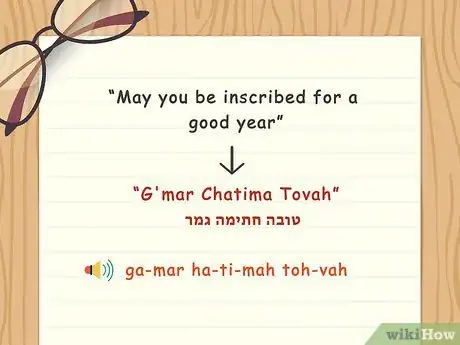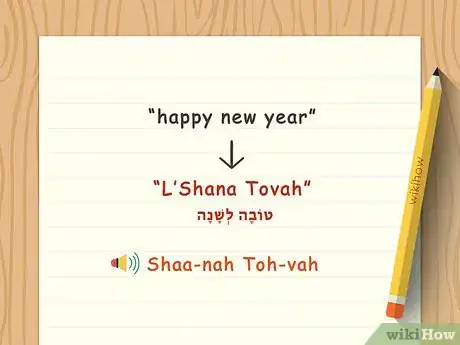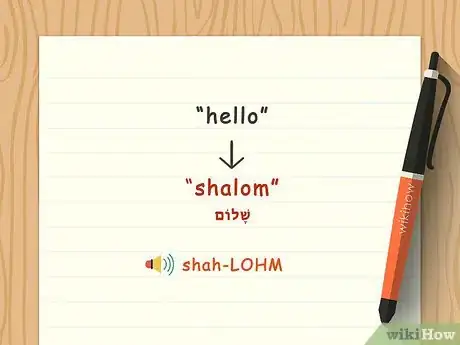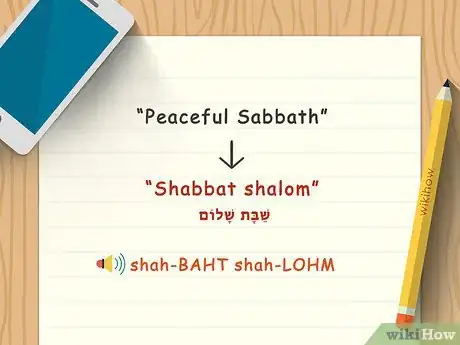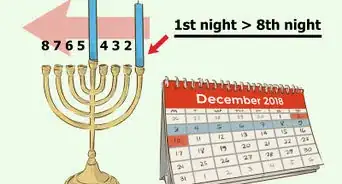This article was co-authored by wikiHow Staff. Our trained team of editors and researchers validate articles for accuracy and comprehensiveness. wikiHow's Content Management Team carefully monitors the work from our editorial staff to ensure that each article is backed by trusted research and meets our high quality standards.
There are 7 references cited in this article, which can be found at the bottom of the page.
This article has been viewed 25,461 times.
Learn more...
Warm greetings are a welcome sound during Yom Kippur. Yom Kippur is a somber day of atonement and fasting, so sensitivity is far more welcome than an invitation to visit the newest restaurant in town. Instead, wish others a good fast and health in the new year. When you can’t think of the right greeting, fall back on common Jewish phrases.
Steps
Using Special Greetings
-
1Greet someone without inviting them to eat and drink. Yom Kippur isn’t a holiday for celebrating. Be aware that the other person is fasting. Food and drink are off the table as. Don’t approach someone with invitations to activities that revolve around eating or drinking until after nightfall. Afterwards, many practitioners will choose to eat traditional Jewish food and recuperate at home.
-
2Wish them an easy fast. Yom Kippur is a solemn day so wishing someone a happy holiday isn’t the best idea. Instead, wish them an easy fast or “Tzom Kal” in Hebrew. This is a great way to show understanding and support towards the challenge of fasting.[1]
- This greeting is best used near the beginning of Yom Kippur. It won’t make much sense to say it near dusk. The fast lasts from one evening to the next evening.
Advertisement -
3Bless them with good health for the coming year. The most direct greeting for Yom Kippur is “g’mar hatimah tovah.” It means “May you be inscribed (or sealed) for a good year (in the Book of Life).” It refers to God sealing the person’s fate in either the Book of Life or Death on Yom Kippur. The Book of Life indicates that the person will live through the year.[2]
- This phrase is sometimes simplified to “g’mar tov.”
-
4Bid them a good new year. On the Jewish calendar, the ten days from Rosh Hashana to Yom Kippur mark the start of the new year. Wish them a good new year or “L’Shana Tovah.” This phrase is similar to “g’mar hatimah tovah.”
- L’Shana Tovah is often used incorrectly to mean “happy new year.” Use good instead of happy when expressing this in your language.
-
5Bid them a good holiday. Gut Yontiff (or good yom tov) is Yiddish and means good holiday. It’s an acceptable greeting for any holiday, including Yom Kippur. Remember, wishing someone a good holiday is more appropriate than wishing them a happy holiday.[3]
- Chag sameach is Hebrew for “joyous festival.” It is also used for many holidays. Yom Kippur isn’t a joyous holiday or a festival, so use a different greeting.
Remembering General Phrases
-
1Say hello by saying shalom. Shalom means peace and is used to say hello or goodbye. This word may be the one you remember best. When you can’t think of a better option, you can use this greeting.[4]
- Say shabbat shalom on a Saturday. It basically means peace on the Sabbath or good Sabbath.
-
2Use Gut Sabbath as a general Saturday greeting. This phrase means good Sabbath. It is an all-purpose greeting on Saturdays. It may be used during Yom Kippur if the holiday falls on a Saturday.[5]
-
3Greet someone by time of day with the word tov. The word “tov” can be adapted for greetings during any time of day. Boker tov means good morning. Tzohora’im Tovim means good afternoon. Erev tov means good evening. Finally, Lilah Tov means good night. These are always acceptable and can be repeated back when your Jewish friends say them first.[6]
-
4Avoid using mazel tov to wish someone good luck. Mazel tov, or “good luck,” does not have the same meaning in Yiddish and Hebrew as it has in English. It is used to express pleasure after a happy event has occurred. When wishing someone good luck for the holiday, bid them an easy fast instead.[7]
References
- ↑ https://www.thoughtco.com/rosh-hashanah-and-yom-kippur-greetings-2076426
- ↑ http://www.myjewishlearning.com/article/yom-kippur-faq-all-about-the-day-of-atonement/#anchor9
- ↑ http://www.chabad.org/library/article_cdo/aid/2315973/jewish/How-Jews-do-Holiday-Greetings.htm
- ↑ http://www.myjewishlearning.com/article/shalom/
- ↑ http://www.dummies.com/languages/hebrew/greeting-and-saying-good-bye-in-hebrew/
- ↑ http://www.omniglot.com/language/phrases/hebrew.php
- ↑ https://www.chabad.org/library/article_cdo/aid/160965/jewish/What-Does-Mazel-Tov-Mean.htm


